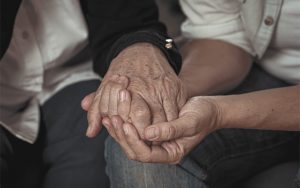 Many of us think of dying as a purely physical act, usually eased by medicines, and overseen by doctors, nurses, and anxious family members. Transitioning from this life, however, is also a spiritual act, a process that is deeply personal. Hospice chaplains help patients connect with whatever they define as “peace giving” in their lives, whether that is a supreme being, nature, relationships with others, or anything else they define as sacred. That role, says Helen MacCallum, chaplain at Avow Hospice in Collier County, is deeply rewarding because it can bring a peace that transcends physical comfort.
Many of us think of dying as a purely physical act, usually eased by medicines, and overseen by doctors, nurses, and anxious family members. Transitioning from this life, however, is also a spiritual act, a process that is deeply personal. Hospice chaplains help patients connect with whatever they define as “peace giving” in their lives, whether that is a supreme being, nature, relationships with others, or anything else they define as sacred. That role, says Helen MacCallum, chaplain at Avow Hospice in Collier County, is deeply rewarding because it can bring a peace that transcends physical comfort.
“Traditional US medical systems look to hospice at end of life for increased levels of care at the patient bedside in body, mind, and spirit,” says MacCallum. “The hospice chaplain is responsible for identifying any unmet spiritual needs or concerns the patient may have that are impeding their ability to experience spiritual peacefulness. The chaplain incorporates pathways into the patient’s plan of care to help free them from the burden of any spiritual distress or existential issues.”
Hospice chaplains are nondenominational and respect all cultures and faith traditions. They also recognize that patients define “coming to peace” in their own unique ways. For some patients, that may mean asking for forgiveness from a supreme being. Others may find peace by reconciling with a loved one, or accepting that such reconciliation, while deeply longed for, will not take place. Still others seek reassurance that they lived their lives well, fulfilling the promises they made and using their talents to their greatest good.
Chaplains are members of the multidisciplinary team that surrounds each hospice patient and family. Other members include physicians, nurses, personal care aides, social workers, and trained volunteers. Because dying is a process that involves body, mind, and spirit, hospice chaplains work closely with other team members to address patient concerns that cross disciplines. “While I am working with a patient who feels guilty for something he or she did in the past, I might look to the team social worker assigned to the patient for assistance or a collaborative visit to ensure we provide maximum support to both the patient and their loved ones,” MacCallum explains.
Hospice patients always have the choice to work with a chaplain – or not. Some may opt to visit with a spiritual leader from their own faith community, or to keep discussions of spiritual concerns private or with only selected family members or friends.
“The last days and weeks of life are a sacred time,” MacCallum continues, “and we respect how the patient and family chooses to move through them. Many patients have a sense of spirituality that has grown or changed over their lifetime; they may want to talk about that. Other patients enjoy creating a sort of life review through talking about what they have been proud of or regretted over the years. This is especially true for our veteran patients, who may hold conflicting feelings about their time of service. Avow’s 5-star We Honor Veterans program helps veterans find peace and a sense of gratitude. I deeply treasure the opportunities I have to thank our veteran patients by presenting them with a blanket, certificate, and pin for their service. Our team is also trained in the unique ways that veterans of each conflict may perceive their service. Some feel spiritually guilty, others are proud of their military accomplishments. Chaplains help patients wherever they are in their spiritual journey.”
Hospice chaplains can baptize patients, facilitate renewal of wedding vows, and offer prayers of release and commendation prior to and at the time of the patient’s death. They often serve as the officiant at memorial and/or graveside services, leading family and friends through a celebration of the patient’s life. They can also connect patients with out-of-town relatives or friends through videoconferencing applications on mobile devices like cell phones and tablets.
“I think of my role as an agent of peace,” says MacCallum. “My job is to listen, to learn, and to love. Spiritual wellness at the end of life is so important, and it is my privilege to help my patients find it, however they define it. That is Avow’s mission: to create peace.”
For more information about Avow’s Hospice, palliative care, or grief support programs, visit www.avowcares.org or call 239-280-2288.









